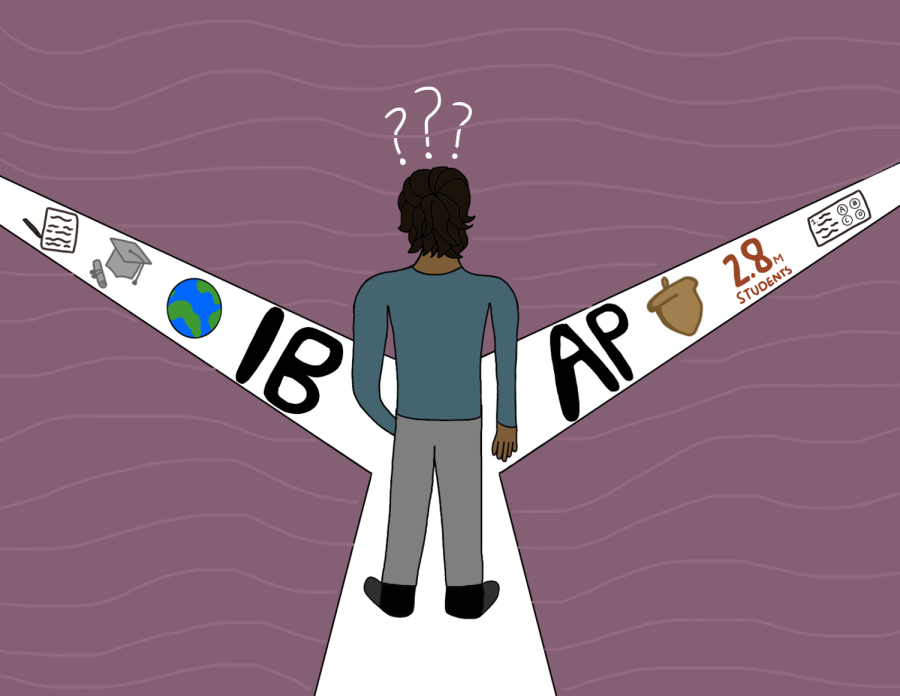AP or IB: Deciding how to meet academic success
With the 2023-24 course registrations ending soon, many students are unsure what courses are a good fit for them. The Sidekick staff writer Ainsley Dwyer compares Advanced Placement and International Baccalaureate courses to help students decide the path that’s right for them.
March 1, 2023
While scrolling through the class registration, you come across a course beginning with IB (International Baccalaureate). You may ask yourself what IB is and if it’s a more beneficial class to take than AP (Advanced Placement). Though the two programs are similar, they are still beneficial in their own ways and have different requirements.
How are they similar?
On a 5.0 GPA scale, both AP and IB courses are weighted at a 6.0. Both classes require in-depth course work and are overall more advanced compared to honors or on-level classes.
According to Coppell High School counselor Laura McMillan, AP and IB classes are the most rigorous courses and time consuming courses offered at CHS. AP and IB classes are equal credits at CHS. Taking the classes can get you college credits, but taking IB would help you obtain college credits for international schools if you seek a degree outside the country.
Advanced Placement
AP is run by College Board and offers students the opportunity to take college-level courses in high school. At the end of the school year, students can take AP exams to earn college credit for universities around the country.
CHS junior Enaika Kishnani is enrolled in both AP and IB courses at CHS.
“Taking AP classes is more fast paced than IB,” Kishnani said. “The information is taught much faster and reviewed at the end of the school year for the AP test. So, if your style of learning is learning the information, practicing and moving on to the next thing, then AP is a better fit than IB.”
AP classes are two semesters (1.0 credit) and students are not required to be enrolled in an AP class to take the AP test at the end of the year. The AP test fee is $100. College Board offers an AP exam fee of $35 fee reduction per AP Exam for eligible students with financial need. Students are eligible for the AP Exam fee reduction on all AP Exams they take in a given year if their family’s annual income falls within the Income Eligibility Guidelines set by the United States Department of Agriculture (USDA) Food and Nutrition Service or they qualify as an “identified student.” College credit is scored based on your performance on the AP test.
The AP test is scored on a scale from one to five. Most colleges award credit for scores of four or five, regardless of the AP subject. Many colleges also accept a three, but credit awarded may vary based on the subject as well as the college.
The AP program is focused on teaching students specific content. Learning in AP classes typically surrounds learning and memorizing the content and eventually using the information to pass the AP test. Taking multiple AP courses can allow students to graduate college early.
International Baccalaureate
IB is a high-level college preparatory program designed for advanced level high school students. Students in the IB program have the option of pursuing either the full IB Diploma or certificates in one or more areas of selected study. IB is much more focused on writing and critical thinking.
Most IB courses are two years. Two year courses count as 1.0 credit for IB and 2.0 credits for CHS. Students who wish to take the IB exam must be enrolled in an IB class or diploma program to take the internal assessments and final IB exams. The IB test fees are $120-$130 for each exam. College credit is scored based on your performance in the class and test.
“IB is more integrated in terms of asking questions about the content.” CHS IB Chemistry teacher Susan Sheppard said. “There is a lot of discussion in an IB class and reflection on what to do with the information now that you know it.”
Though some colleges only award students with college credits if they decide to hold the full IB diploma, some colleges will award credit for individual exams as do colleges for AP tests.
AP and IB College Credit
Students can take college-level classes in high school through the College Board’s AP program, which provides college credit from colleges at the end of the school year. Most colleges provide credit for scores of four or five (some accept credit for a three) on the AP exam, which is graded on a scale of one to five.
IB is a college preparatory program designed for advanced level high school students. Some colleges will reward students if they decide to pursue the full IB diploma. Though, some give credit for the individual exams. IB shines more of a spotlight on students’ writing and critical thinking.
Follow Ainsley (@ainsleydwyer) and @CHSCampusNews on Twitter











